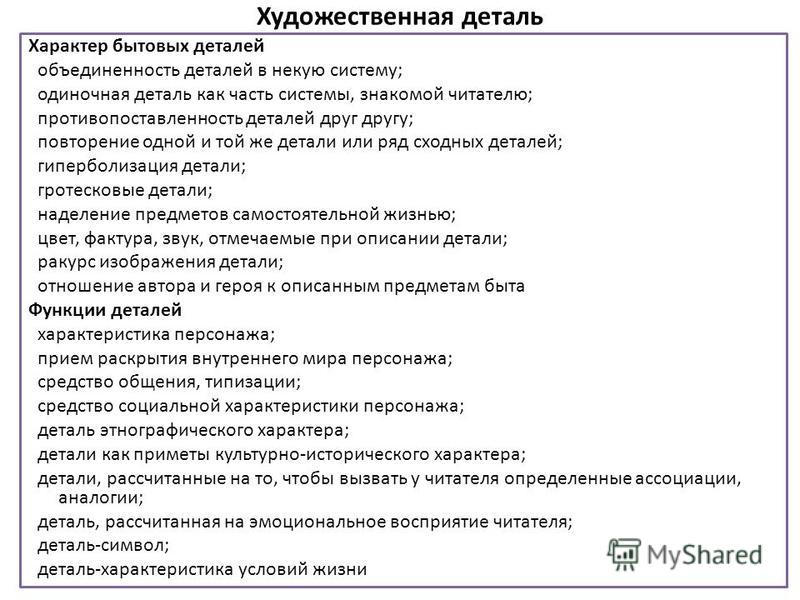Read the fragment of the work below and complete tasks 1-7; 8, 9.
"Undergrowth" D.I. Fonvizin
Pravdin (Mitrofan). How far are you in history?
Mitrofan. Is it far? What's the story. In another you will fly to distant lands, to thirty kingdoms.
Pravdin. BUT! so Vralman teaches you this story?
Starodum. Vralman? The name is familiar.
Mitrofan. No, our Adam Adamych does not tell stories; he, what am I, himself a hunter to listen.
Ms. Prostakova. Both of them force themselves to tell stories to the cowgirl Khavronya.
Pravdin. Didn't you both study geography with her?
Ms. Prostakova (son). Do you hear, my dear friend? What is this science?
Mitrofan (quiet mother). And how much do I know.
Ms. Prostakova (quietly to Mitrofan). Don't be stubborn, darling. Now show yourself.
Mitrofan (quiet mother). Yes, I do not understand what they are asking.
Ms. Prostakova (Pravdin). What, father, did you call science?
Pravdin. Geography.
Ms. Prostakova (Mitrofan). Do you hear, georgaphia.
Mitrofan. Yes, what is it! Oh my God! They stuck with a knife to the throat.
Ms. Prostakova (Pravdin). And you know, father. Yes, tell him, do me a favor, what kind of science is it, he will tell it,
Pravdin. Description of the land.
Ms. Prostakova (Starodum). And what would it serve in the first case?
Starodum. In the first case, it would also fit the fact that if it happened to go, you know where you are going.
Ms. Prostakova. Ah, my father! Yes, cabbies, what are they for? It's their business. This is not a noble science either. Gentleman, just say: take me there, they will take me wherever you please. Believe me, father, that, of course, that is nonsense, which Mitrofanushka does not know.
Starodum. Oh, of course, ma'am. In human ignorance, it is very comforting to consider everything as nonsense that you do not know.
Ms. Prostakova. Without science people live and lived. The deceased father was a voivode for fifteen years, and with that he deigned to die, because he did not know how to read and write, but he knew how to earn and save enough. He always received petitions, sometimes sitting on an iron chest. After every chest will open and put something. That was the economy! He did not spare his life, so as not to take anything out of the chest. I won’t boast before another, I won’t hide from you: the dead light, lying on a chest with money, died, so to speak, of hunger. BUT! what is it??
Starodum. commendable. You have to be a Skotinin to taste such a blissful death.
Skotinin. But if you want to prove that learning is nonsense, then let's take Uncle Vavila Faleleich, Nobody ever heard of a letter from him, nor did he want to hear from anyone: what a goloushka!
Pravdin. What is it?
Skotinin. Yes, that's what happened to him. Riding on a greyhound pacer, he ran drunk into the stone gates. The man was tall, the gate was low, he forgot to bend down. As soon as he had enough of himself with his forehead against the lintel, the Indo bent his uncle to the top of his head, and a vigorous horse carried him out of the gate to the porch on his back. I would like to know if there is a learned forehead in the world that would not fall apart from such a cuff; and uncle, eternal memory to him, having sobered up, asked only if the gate was intact?
Milon. You, Mr. Skotinin, admit yourself to be an unlearned person; however, I think in this case your forehead would be no stronger than a scientist.
Starodum (Milon). Don't worry about betting. I think that the Skotinins are all kind of strong-willed.
When completing tasks 1-7, the answer must be given in the form of a word or a combination of words. Write words without spaces, punctuation marks and quotation marks.
1
Indicate the name of the literary movement that dominated in the 18th century, the principles of which were reflected in the dramaturgy of D.I. Fonvizin.
2
Name the genre to which Fonvizin's "Undergrowth" belongs.
3
The heroes of "Undergrowth" have surnames, the sound of which is their peculiar characteristic. What are these surnames called?
4
5
The basis of the action of the play is the conversation of the characters, the exchange of remarks. What is the name of given form character communication?
6
In the stories of Mrs. Prostakova and Skotinin, the “dead father” and Uncle Vavila Faleleich appear. What are the names of the characters mentioned in the speech of the heroes, but not appearing on the stage?
7
What term is used to designate a significant small detail that contains important meaning(for example, the father's chest from the story of Mrs. Prostakova)?
Part 2.
Read the work below and complete tasks 10-14; 15, 16.
"Anchar" * A.S. Pushkin
In the desert stunted and stingy,
On the ground, the heat of the red-hot,
Anchar, like a formidable sentry,
The nature of the thirsty steppes
She gave birth to him on the day of wrath,
And green dead branches
And watered the roots with poison.
Poison drips through its bark,
By noon, melting from the heat,
And freezes in the evening
Thick transparent resin.
Not even a bird flies to him,
Will run into the tree of death -
And if the cloud irrigates,
Wandering, its dense leaf,
From its branches, already poisonous,
But man man
And he obediently flowed on the way
And by morning he returned with poison.
He brought the tar of death
yes branch with withered leaves,
And sweat on a pale brow
It flowed in cold streams;
Brought - and weakened and lay down
Under the arch of the hut on the basts,
And the poor slave died at the feet
Invincible lord.
And the king fed that poison
Your obedient arrows
And with them death sent
To neighbors in alien confines.
* Tree of poison. (Approx. Pushkin.)
The answer to tasks 10–14 is a word or phrase, or a sequence of numbers. Enter your answers without spaces, commas, or other additional characters.
10
At the beginning of the poem, a description of the desert is given. What is a description like this called? work of art?
11
What technique does the poet use in the phrase “Anchar, like a formidable sentry, stands ...”?
12
What is the name of a figurative definition that serves as a means artistic expressiveness(“black whirlwind”, “combustible sand”, etc.)?
13
Indicate the name of the stylistic device that gives the verse a special sound expressiveness (“And he obediently flowed on the way”).
14
Indicate the size in which the poem by A.S. Pushkin "Anchar" (give an answer in nominative case without specifying the number of stops).
The examination paper in literature consists of 3 parts. It takes 4 hours (240 minutes) to complete it. We recommend to allocate the time to complete the work as follows: for parts 1, 2 - no more than 2 hours, for part 3 - 2 hours.
Parts 1 and 2 include an analysis of a literary text: a fragment of an epic, lyric-epic or dramatic work, as well as lyrical work. Carefully read each of the proposed texts and consistently perform a series of tasks aimed at identifying the features of the content and form of the works under consideration, as well as their links with the works of other authors.
Analysis of the text of an epic (or dramatic) work has following structure: 7 tasks with a short answer (B), requiring the writing of a word or a combination of words, and 2 tasks with a detailed answer (C1-C2), requiring writing an answer in the amount of 5-10 sentences.
The analysis of a lyrical work includes 5 tasks with a short answer (B) and 2 tasks with a detailed answer (C3-C4) in the amount of 5-10 sentences. When completing tasks C1-C4, try to formulate a direct answer to the question posed, avoiding lengthy introductions and characteristics.
To save time when completing tasks with a short answer, skip those that cause you difficulty: you can return to them after completing the work, if there is time.
- When starting to complete the task of part 3, select one of the three proposed problematic questions and give a written detailed reasoned answer to it in the essay genre (in the amount of at least 200 words).
For each correct answer, depending on the level of difficulty of the task, you can get one or more points. The points you get for completed tasks are summed up. Try to complete as many tasks as possible and score the largest number points.
PART 1
Read the text fragment below and complete tasks B1-B7; C1-C2.
Lopakhin. I want to tell you something very pleasant, cheerful. (Glancing at his watch.) I’m leaving now, I don’t have time to talk ... well, I’ll say it in two or three words. You already know The Cherry Orchard yours is being sold for debts, auctions are scheduled for August 22, but don't worry, my dear, sleep well, there is a way out ... Here is my project. Attention please! Your estate is only twenty miles from the city, near Railway, and if the cherry orchard and the land along the river are divided into summer cottages and then leased out for summer cottages, then you will have at least twenty-five thousand a year income.
Gaev. Sorry, what nonsense!
Lyubov Andreevna. I don't quite understand you, Yermolai Alekseich.
Lopakhin. You will charge the dacha owners at the very least twenty-five rubles a year for a tithe, and if you announce it now, then, I guarantee with anything, you will not have a single free patch left until the autumn, everything will be sorted out. In a word, congratulations, you are saved. The location is wonderful, the river is deep. Only, of course, you need to clean it up, clean it up ... for example, let's say, demolish all the old buildings, this house, which is no longer good for anything, cut down the old cherry orchard ...
Lyubov Andreevna. Cut down? My dear, I'm sorry, you do not understand anything. If there is anything interesting, even remarkable, in the whole province, it is only our cherry orchard.
Lopakhin. The only remarkable thing about this garden is that it is very large. Cherry is born every two years, and even that has nowhere to go, no one buys.
Gaev. And in " encyclopedic dictionary is mentioned about this garden.
Lopakhin (looking at the clock). If we don’t think of anything and don’t come to anything, then on the twenty-second of August both the cherry orchard and the whole estate will be sold at auction. Make up your mind! There is no other way, I swear to you. No and no.
Firs. AT former time, about forty-fifty years ago, they dried cherries, soaked them, pickled them, cooked jam, and it happened ...
Gaev. Shut up, Firs.
Firs. And, it used to be, dried cherries were sent by carts to Moscow and Kharkov. There was money! And then dried cherries were soft, juicy, sweet, fragrant... Then they knew the way...
Lyubov Andreevna. Where is this method now?
Firs. Forgot. Nobody remembers.
Pishchik (Lyubov Andreevna). What's in Paris? How? Did you eat frogs?
Lyubov Andreevna. Ate crocodiles.
Pishchik. You think...
Lopakhin. Until now, there were only gentlemen and peasants in the village, but now there are more summer residents. All towns, even the smallest ones, are now surrounded by dachas. And we can say that in twenty years the summer resident will multiply to extraordinary. Now he only drinks tea on the balcony, but it may happen that on his one tithe he will take care of the household, and then your cherry garden will become happy, rich, luxurious ...
Gaev(in outraged). What nonsense!
(A.P. Chekhov, "The Cherry Orchard")
The answer to tasks B1-B7 is a word or phrase. Write the answers first in the text of the work, and then transfer them to the answer sheet No. 1 to the right of the number of the corresponding task, starting from the first cell, without spaces or any additional characters. Write each letter in a separate box in accordance with the samples given in the form.
Q1 Name the literary trend that flourished in the second half of the 19th century and whose principles are reflected in the play by A.P. Chekhov "The Cherry Orchard".
B3 The above scene conveys the conversation of the characters among themselves. What is the term for this form of communication between characters in a work of art?
Answer:_______________
В4 Indicate the surname of a character who is not internally connected to the problem discussed by the characters and causes the corresponding reaction of Lyubov Andreevna.
Answer:_______________
Q5 What is the name of a significant detail that serves as a means of characterizing a character (for example, a watch that Lopakhin repeatedly glances at)?
Answer:________________
Q6 What term denotes the author's remarks and explanations in the course of the play (Gaev (indignant), etc.)?
Answer:________________
B7 At the heart of the dispute about the fate of the estate and the garden lies a clash of positions and opinions. Indicate the term that refers to such a collision that underlies the plot.
Answer:________________
To complete tasks C1 and C2, use the answer sheet No. 2. First write down the task number, and then give a coherent answer to the question in the amount of 5-10 sentences. Write your answers clearly and legibly.
C1 What explains the negative reaction of Ranevskaya and Gaev to Lopakhinsky's project to save the estate?
C2 In what works of Russian classics is the plot based on a clash of representatives of different eras, and in what ways can these works be compared with The Cherry Orchard? (Give 2-3 examples with names of authors.)
PART 2
Read the poem below and complete tasks B8-B12; SZ-S4.
The hazy noon breathes lazily;
The river rolls lazily;
And in the fiery and pure firmament
Clouds drift lazily.
And all nature, like fog,
A hot slumber envelops;
And now the great Pan himself
In the cave the nymphs doze peacefully.
(F.I. Tyutchev, late 1820s.)
The answer to tasks B8-B12 is a word or phrase. Write the answers first in the text of the work, and then transfer them to the answer sheet No. 1 to the right of the number of the corresponding task, starting from the first cell, without spaces or any additional characters. Write each letter in a separate cell in accordance with the samples given in the form.
B8 Name the method of animating an inanimate object used by F.I. Tyutchev in the cited poem ("... noon breathes ...").
Answer:________________
Q9 What means of artistic expression does the author resort to in the lines: “And all nature, like fog, / Hot drowsiness embraces”?
Answer:_________________
Q10 What term refers to the repetition of the initial parts of lines in a poem:
The hazy noon breathes lazily;
Lazily the river rolls...?
Answer:_________________
Q11 What are the names of figurative definitions that serve as an expressive and pictorial means (“misty noon”, “hot nap”)?
Answer: _________________
B12 Determine the size in which the poem "Noon" is written (without indicating the number of feet).
Answer:__________________
To complete tasks C3 and C4, use the answer sheet No. 2. First write down the task number, and then give a coherent answer to the question in the amount of 5-10 sentences. Write your answers clearly and legibly.
C3 How is the poet's thought about the animation of nature expressed in the poem "Noon"?
C4 Which of the Russian poets displayed the richness of the natural world and what is the poem of F.P. Tyutchev's "Noon" is consonant with the works of these poets? (Give 2-3 examples.)
PART 3
To complete the task of part 3, use the answer sheet No. 2. Choose only ONE of the tasks below (C5.1, C5.2, C5.3). In the answer sheet, write down the number of the task you have chosen. Give a complete answer to problematic issue(in the amount of at least 200 words), attracting the necessary theoretical and literary knowledge, relying on literary works, the position of the author and, if possible, revealing his own vision of the problem. Write your answer clearly and legibly.
C5.1 What is the place and significance of the image of Savelich in the novel by A.S. Pushkin "The Captain's Daughter"
C5.2 What role did investigator Porfiry Petrovich play in the fate of Rodion Raskolnikov? (Based on the novel by F.M. Dostoevsky "Crime and Punishment".)
C5.3 What is the manifestation of the complexity, the drama of the inner world of the lyrical heroine M.I. Tsvetaeva?
Assessment system for examination work in literature
For the correct answer to tasks B1-B12, 1 point is given, for an incorrect answer or its absence - 0 points.
Answers to tasks B1-B12
job number | Answer |
Pishchik<или>Simeonov-Pishchik |
|
conflict |
|
personification<или>metaphor |
|
comparison |
|
anaphora<или>unity of command |
|
CRITERIA FOR VERIFICATION AND EVALUATION OF THE PERFORMANCE OF TASKS WITH A DETAILED ANSWER
Attention! When assigning points for completing a task in the “Protocol for checking answers to tasks” of form No. 2, it should be borne in mind that if no answer(there are no records indicating that the examinee started the task), then an “X” is entered in the protocol, not a “0”.
Evaluation of the fulfillment of tasks С1 and СЗ
Accuracy and completeness of the answer | Points |
a) the examinee reveals an understanding of the specifics of the task: he reasonably answers the question, putting forward the necessary theses, giving arguments developing them and drawing appropriate conclusions, there are no factual errors in the answer; | |
b) the examinee reveals an understanding of the specifics of the task, but when answering does not demonstrate sufficient validity of judgments, | |
c) the examinee understands the task in a simplified way, argues superficially, inaccurately, weakly arguing the answer, replacing the analysis with retelling, | |
d) the examiner answers the question incorrectly, | |
Maximum score |
Evaluation of the fulfillment of tasks С2, С4
A detailed answer of a limited volume (5-10 sentences). Indication of the volume is conditional; the assessment of the answer depends on its content (with the ability to accurately formulate their thoughts, the examinee can answer quite fully and in a smaller volume).
Accuracy and completeness of the answer | Points |
the examinee reveals an understanding of the specifics of the task: answers a question that requires the involvement of a literary context, gives at least two positions of comparison | |
the examinee answers the question, gives two positions of comparison (indicates works and authors), for one of which he gives a detailed reasoned justification; | |
the examinee answers the question, gives two positions of comparison, for none of them giving a detailed reasoned justification or not giving a justification; | |
the examinee does not answer the question, | |
Maximum score |
Evaluation of the fulfillment of tasks C5.1, C5.2, C5.3
Among the five positions by which the performance of the tasks of part 3 is assessed, the first position (substantive aspect) is the main one. If when checking examination work the expert on the first (meaningful) aspect of evaluating the answer puts "0" points, the task of part 3 is considered not completed. The task is not checked further. For four other aspects (positions) of assessment (2, 3, 4, 5) in the "Protocol for checking answers to tasks" of form No. 2, "0" points are set.
The score for the first position of the assessment of the task of part 3 is placed in column 5 of the protocol, for the second position - in column 6, for the third - in column 7, for the fourth - in column 8, for the fifth - in column 9.
When assessing the performance of the tasks of part 3, the volume of the written essay should be taken into account. Examinees are recommended to have at least 200 words. If the essay contains less than 150 words (the word count includes all words, including service words), then such work is considered unfulfilled and is evaluated with zero points.
When the amount of work is from 150 to 200 words or more, the maximum number of errors for each point level does not change.
1. Depth and independence of understanding of the problem proposed in the question | Points |
a) the examinee shows an understanding of the problem proposed in the question; | |
b) the examinee finds an understanding of the problem proposed in the question, and offers an explanation of its meaning, but is limited general theses related to the problems of the work, not in all cases supporting the judgments with the necessary arguments and conclusions, | |
c) the examinee shows an understanding of the problem proposed in the question, but explains its meaning superficially or extremely simplified, | |
d) the examinee does not show understanding of the problem proposed in the question, |
2. Level of theoretical and literary knowledge | Points |
a) the examiner discovers high level possession of theoretical and literary knowledge, manifested in the appropriate application of relevant literary terms in the analysis literary material and explanation of the functions of certain literary devices; | |
b) the examinee reveals a sufficient level of theoretical and literary knowledge, but allows some inaccuracies in the use of terms in the analysis of literary material, does not explain functional role certain literary devices; | |
c) the examinee does not reveal a sufficient level of theoretical and literary knowledge, makes mistakes in the use of terms in the analysis of literary material; | |
d) the examinee does not have theoretical and literary knowledge, does not use literary terms in the analysis of literary material. |
3. The validity of the involvement of the text of the work | Points |
||
a) the text of the work in question is involved reasonably and sufficiently versatile (citations with comments to them, brief retelling content necessary to prove judgments, appeal to the micro-themes of the text and their interpretation, different kind links to what is depicted in the work, etc.); | |||
b) the text is involved quite versatile, but not always expediently and reasonably, | |||
c) the text is involved only as a retelling of what is depicted, without the necessary commentary; | |||
d) the text is not involved, judgments are not substantiated by the text. | |||
4. Consistency and consistency of presentation | Points |
||
a) the parts of the statement are logically connected, the thought develops from part to part, there are no violations of the sequence within semantic parts statements and unreasonable repetitions; | |||
b) the parts of the statement are logically interconnected, the thought develops from part to part, but there are repetitions and violations of the sequence within the semantic parts of the statement; | |||
c) parts of the statement are logically interconnected, but the thought is repeated and does not develop, there are deviations from the main problem proposed in the question; | |||
G) gross violations sequences, unreasonable repetitions, lack of connection between parts and within parts, | |||
5. Following the rules of speech | Points |
||
a) 1 speech error is allowed; | |||
b) 2-3 speech errors were made; | |||
c) 4 speech errors were made; | |||
d) the number of admitted speech errors significantly complicates the understanding of the meaning of the statement (5 or more speech errors were made). | |||
Maximum score |
What is the name of an expressive detail that carries an important semantic load in a literary text (for example, a young month covered with smoke at the beginning and at the end of a fragment)?
Read the text fragment below and complete tasks B1-B7; C1-C2.
By dusk, the cannonade began to subside. Alpatych came out of the basement and stopped at the door. The once clear evening sky was covered in smoke. And through this smoke a young, high-standing sickle of the moon shone strangely. After the former terrible rumble of guns had fallen silent over the city, silence seemed to be interrupted only by the rustle of steps, groans, distant screams and the crackling of fires, as it were spread throughout the city. The groans of the cook are now quiet. From both sides, black clouds of smoke from fires rose and dispersed. On the street, not in rows, but like ants from a ruined tussock, in different uniforms and in different directions soldiers passed and ran. In the eyes of Alpatych, several of them ran into Ferapontov's yard. Alpatych went to the gate. Some regiment, crowding and hurrying, blocked the street, going back.
“The city is being surrendered, leave, leave,” the officer, who noticed his figure, said to him and immediately turned to the soldiers with a cry:
- I'll let you run around the yards! he shouted.
Alpatych returned to the hut and, calling the coachman, ordered him to leave. Following Alpatych and the coachman, all Ferapontov's household went out. Seeing the smoke and even the lights of the fires, which were now visible in the beginning twilight, the women, who had been silent until then, suddenly began to wail, looking at the fires. As if echoing them, similar cries were heard at the other ends of the street. Alpatych with a coachman, with trembling hands, straightened the tangled reins and horses' lines under a canopy.
When Alpatych was leaving the gate, he saw ten soldiers in the open shop of Ferapontov pouring sacks and knapsacks with wheat flour and sunflowers with a loud voice. At the same time, returning from the street to the shop, Ferapontov entered. Seeing the soldiers, he wanted to shout something, but suddenly stopped and, clutching his hair, burst out laughing with sobbing laughter.
— Get it all, guys! Don't get the devils! he shouted, grabbing the sacks himself and throwing them out into the street. Some soldiers, frightened, ran out, some continued to pour. Seeing Alpatych, Ferapontov turned to him.
— Decided! Russia! he shouted. - Alpatych! decided! I'll burn it myself. I've made up my mind..." Ferapontov ran into the yard.
Soldiers walked continuously along the street, filling it all up, so that Alpatych could not pass and had to wait. The hostess Ferapontova with the children was also sitting on the cart, waiting to be able to leave.
It was already quite night. There were stars in the sky and a young moon shone from time to time, shrouded in smoke. On the descent to the Dnieper, the carts of Alpatych and the hostess, slowly moving in the ranks of soldiers and other crews, had to stop. Not far from the crossroads where the carts had stopped, in an alleyway, a house and shops were on fire. The fire has already burned out. The flame either died away and was lost in black smoke, then it suddenly flashed brightly, strangely clearly illuminating the faces of the crowded people standing at the crossroads.
L. N. Tolstoy "War and Peace"
Explanation.
Such a detail is called a detail. Let's give a definition.
An expressive detail that carries an important semantic load in a literary text is called a detail.
Answer: detail.
Answer: detail|artistic detail
USE TEST - 2014 IN LITERATURE
OPTION 1
Practice test to prepare for passing the exam- 2014 in literature. Tasks included in given test, are fully consistent with the tasks of future real options examination paper in terms of quantity, form, level of complexity and other parameters.
USE tests- 2014 in Literature consist of three parts.
Part 1 includes 7 tasks with a short answer (B1 - B7), requiring the writing of a word, or a combination of words, or a sequence of numbers, and 2 tasks with a detailed answer (C1 - C2) in the amount of 5 - 10 sentences.
Part 2 includes 5 tasks with a short answer (B8 - B12) and 2 tasks with a detailed answer in the amount of 5 - 10 sentences (C3 - C4).
Part 3
includes 3 tasks, from which you need to choose only one and give a detailed reasoned answer to it in the genre of writing on literary theme no less than 200 words.
PART 1
Read the fragment of the work below and complete tasks B1 - B7; C1, C2.
By dusk, the cannonade began to subside. Alpatych came out of the basement and stopped at the door. The once clear evening sky was covered in smoke. And through this smoke a young, high-standing sickle of the moon shone strangely. After the former terrible rumble of guns had fallen silent over the city, silence seemed to be interrupted only by the rustle of steps, groans, distant screams and the crackling of fires, as it were spread throughout the city. The groans of the cook are now quiet. From both sides, black clouds of smoke from fires rose and dispersed. On the street, not in rows, but like ants from a ruined tussock, soldiers in different uniforms and in different directions passed and ran through. In the eyes of Alpatych, several of them ran into Ferapontov's yard. Alpatych went to the gate. Some regiment, crowding and hurrying, blocked the street, going back.
“The city is being surrendered, leave, leave,” the officer who noticed his figure said to him and immediately turned to the soldiers with a cry:
- I'll let you run around the yards! he shouted.
Alpatych returned to the hut and, calling the coachman, ordered him to leave. Following Alpatych and the coachman, all Ferapontov's household went out. Seeing the smoke and even the lights of the fires, which were now visible in the beginning twilight, the women, who had been silent until then, suddenly began to wail, looking at the fires. As if echoing them, similar cries were heard at the other ends of the street. Alpatych with a coachman, with trembling hands, straightened the tangled reins and horses' lines under a canopy.
When Alpatych was leaving the gate, he saw ten soldiers in the open shop of Ferapontov pouring sacks and knapsacks with wheat flour and sunflowers with a loud voice. At the same time, returning from the street to the shop, Ferapontov entered. Seeing the soldiers, he wanted to shout something, but suddenly stopped and, clutching his hair, burst out laughing with sobbing laughter.
- Get it all, guys! Don't get the devils! he shouted, grabbing the sacks himself and throwing them out into the street. Some soldiers, frightened, ran out, some continued to pour. Seeing Alpatych, Ferapontov turned to him.
- Decided! Russia! he shouted. - Alpatych! Decided! I'll burn it myself. I decided ... - Ferapontov ran into the yard.
Soldiers walked continuously along the street, filling it all up, so that Alpatych could not pass and had to wait. The hostess Ferapontova with the children was also sitting on the cart, waiting to be able to leave.
It was already quite night. There were stars in the sky and a young moon shone from time to time, shrouded in smoke. On the descent to the Dnieper, the wagons of Alpatych and the hostess, slowly moving in the ranks of soldiers and other crews, had to stop. Not far from the crossroads where the carts had stopped, in an alleyway, a house and shops were on fire. The fire has already burned out. The flame either died away and was lost in black smoke, then it suddenly flashed brightly, strangely clearly illuminating the faces of the crowded people standing at the crossroads.
(L.N. Tolstoy "War and Peace")
AT
1. Specify literary direction, the principles of which were embodied in the novel by L.N. Tolstoy "War and Peace".
IN 2. What definition is added to the word "novel", characterizing the genre of "War and Peace"?
AT 3. What is the technique used by the author when painting a picture of retreat ("... like ants from a ruined tussock<...>, passed and ran soldiers").
AT 4. Establish a correspondence between the characters-nobles and their actions during the war.
For each position in the first column, select the corresponding position from the second column.
Write your answer in numbers in the table and transfer it to the answer sheet No. 1.
| BUT | B | AT |
AT 5. What term denotes the method of displaying the internal state of the characters, the thoughts and feelings that own them ("Alpatych with a coachman straightened the tangled reins with shaking hands"; "grabbing his hair, he laughed with sobbing laughter")?
AT 6. What is the name of the expressive detail that carries in artistic text important semantic load(for example, a young month covered with smoke at the beginning and at the end of the fragment?)
AT 7. The fragment begins and ends with a description of the fire in Smolensk. Indicate the term that denotes the location and relationship of parts, episodes, images in a work of art.
To complete tasks C1 and C2, use the answer sheet No. 2.
Performing task C2, select two works for comparison different authors(in one of the examples, it is permissible to refer to the work of the author who owns source text); indicate the titles of the works and the names of the authors; justify your choice and compare the works with the proposed text in given direction analysis.
C1. What, from your point of view, can explain the "strange" behavior of the merchant Ferapontov in the above episode?
C2. In what works of Russian classics does the theme of a man in war sound and what brings these works closer to the novel by L.N. Tolstoy?
PART 2
Read the work below and complete tasks B8 - B12; C3, C4.
You are my fallen maple, icy maple,
Why are you standing, bending down, under a white blizzard?
Or what did you see? Or what did you hear?
As if you went out for a walk in the village.
And, like a drunken watchman, going out onto the road,
He drowned in a snowdrift, froze his leg.
Oh, and now I myself have become somewhat unstable,
I won't get home from a friendly drinking party.
There he met a willow, there he noticed a pine tree,
He sang songs to them under a blizzard about summer.
To myself I seemed to be the same maple,
Only not fallen, but with might and main green.
And, having lost modesty, having become foolish on the board,
Like someone else's wife, he hugged a birch.
(S. A. Yesenin, 1925)
AT 8. Referring to the maple, "frozen foot", lyrical hero poems "humanizes" him. What is the name of this technique?
AT 9. Enter a name stylistic device, which consists in the use of the same vowel sounds, which enhances expressiveness artistic speech and designed for auditory perception image ("I'm drowning in a snowdrift, I froze but gu").
AT 10 O'CLOCK. What is the name of the figurative definition, which is a means of artistic expression ("iced maple", "under a white blizzard")?
AT 11. From the list below, select three names of artistic means and techniques used by the poet in the first two couplets of this poem.
1) rhetorical question
2) neologism
3) inversion
4) comparison
5) grotesque
Enter the corresponding numbers in the table and transfer them to the answer sheet No. 1.
AT 12. Indicate the size in which the poem was written by S.A. Yesenin.
To complete tasks C3 and C4, use the answer sheet No. 2.
Write down the task number first, and then give a direct coherent answer to the question ( approximate volume- 5-10 sentences).
Performing task C4, select two works of different authors for comparison (in one of the examples, it is permissible to refer to the work of the author who owns the source text); indicate the titles of the works and the names of the authors; justify your choice and compare the works with the proposed text in the given direction of analysis.
Write down your answers clearly and legibly, following the rules of speech.
C3. What, in your opinion, is the secret of the musicality and emotional expressiveness of Yesenin's poem?
C4. Which of the Russian poets addressed the topic of the commonality of man and nature, and in what way their works are consonant with the poem by S.A. Yesenin?
PART 3
To complete the task of part 3, select only ONE of the proposed essay topics (C5.1, C5.2, C5.3).
In the answer form No. 2, indicate the number of the topic you have chosen, and then write an essay on this topic in the amount of at least 200 words (if the amount of the essay is less than 150 words, then it is rated 0 points).
Argument your theses based on literary works (in an essay on lyrics, you must analyze at least three poems).
Use literary-theoretical concepts to analyze the work.
Consider the composition of the essay.
Write your essay clearly and legibly, following the rules of speech.
C5.1. As in the lyrics of M.Yu. Lermontov, the romantic ideal of the poet was embodied?
C5.2. How do you understand the phenomenon of "Oblomovism"? (According to the novel by I.A. Goncharov "Oblomov").
C5.3. In what way did the sermons of the wanderer Luke influence the fate of the overnight shelters? (According to the play by M. Gorky "At the bottom".)
- Next >
Content 1. Dramatic genres. 2. Views dramatic works. 3. Comedy as a genre, types of comedy. 4. D. Fonvizin "Undergrowth". Traditions of classicism in comedy. Innovation of Fonvizin the playwright. plot elements. plot and composition. 5. "Woe from Wit" Griboedov. genre features. 6. Character dramatic conflict in plays by Fonvizin, Griboyedov, Ostrovsky. 7.N.V. Gogol "Inspector". Conflict. Genre. Composition. Plot. 8. Plot elements, chronotope in Ostrovsky's play "Thunderstorm". 9. Formulations test tasks.
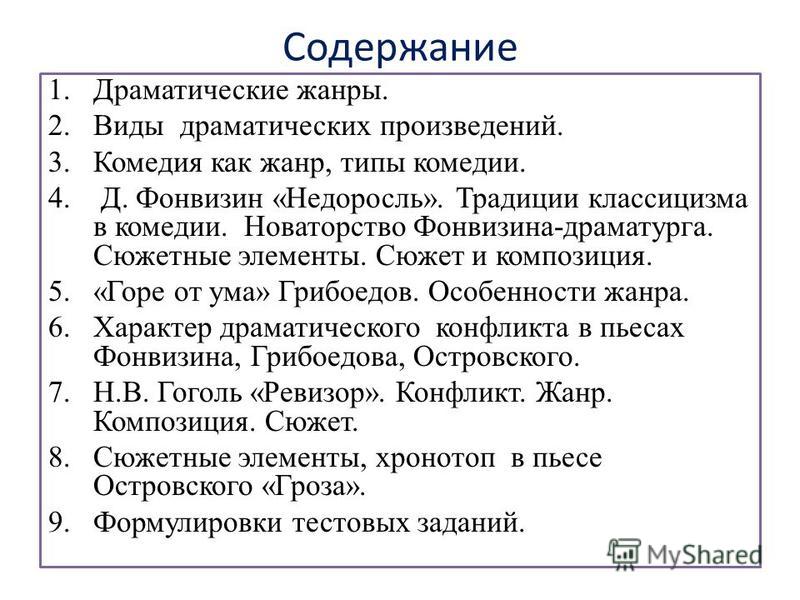
Designed for stage performance. Main text- these are the statements of characters in the form of dialogue and monologue. There is no narrative speech, no descriptions. The emphasis shifts to the actions of the characters and their speech. The voice of the author is present only in remarks (in the author's instructions about the setting of the action, about internal state heroes, their facial expressions and gestures) and posters. The author's position is expressed indirectly, the word here is given to the characters themselves. Means, speech characteristic becomes the most important artistic medium expressions of the author's idea.
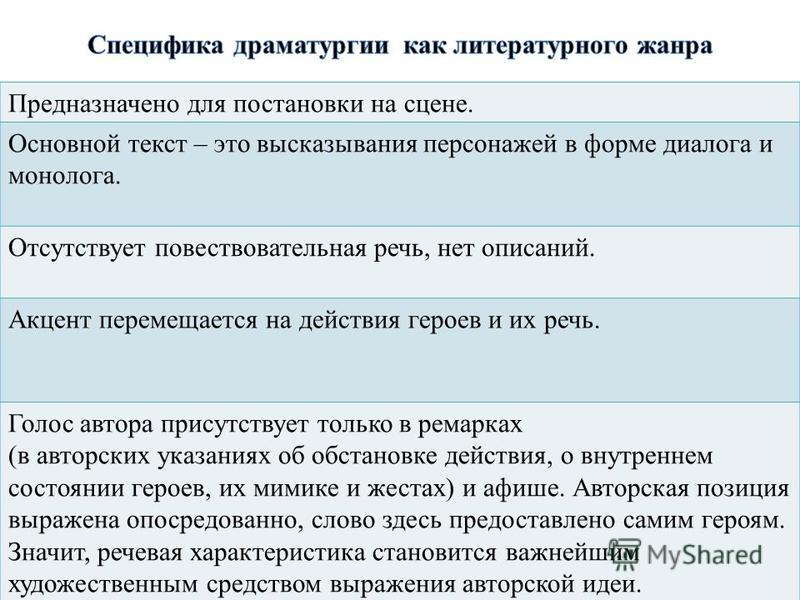
Tragedy A type of drama based on sharp, irreconcilable life conflicts; the character of the hero is revealed in an unequal, tense struggle, dooming him to death. Comedy A type of drama in which characters and situations are presented in comic, comic forms; here accusing human vices and revealing negative sides life. Varieties of comedy according to the nature of the content: - sitcom (source of funny - events, ingenious intrigue); - a comedy of characters (the source of the funny is clearly typified characters of the characters); - comedy of ideas (the source of the funny is the idea of the writer); - tragicomedy (laughter is permeated with the consciousness of the imperfection of a person and his life); Drama Literary work, which depicts serious conflict, the fight between actors Vaudeville A type of drama, a light play with couplet songs, entertaining intrigue, romances, dances Interlude A small comic play or scene played out between the actions of the main play, and sometimes in the text of the play itself. Insertion of a comic or musical scene in a play in Russia Dramatic genres

Types of dramatic works Tragedy ComedyDrama Plot basis: Initially: mythological and historical plots. Later - turning, culminating, moments in the history and fate of a person. Everyday stories associated with everyday life person and relationships in the family, with neighbors, colleagues, etc. Can use storylines, characteristic of both tragedy and comedy Main characters: Originally: gods, heroes of myths, historical figures; Later - strong, powerful characters, carrying a certain idea, for the sake of which they agree to sacrifice everything. Ordinary people, townspeople, villagers with their daily worries, sorrows and joys, tricks, successes and failures. Any heroes.
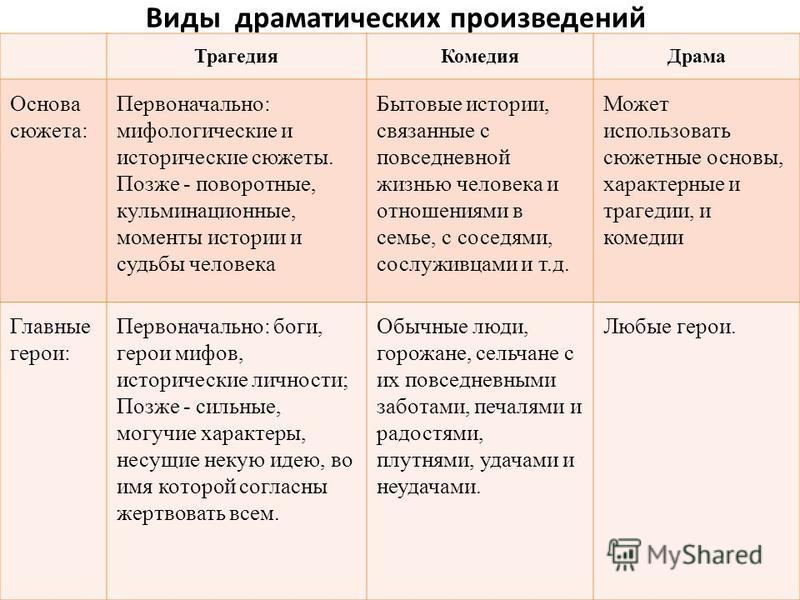
Conflict: Tragic, or irresolvable. It is based on the great "eternal" questions of being. Comic, or resolvable in the course of the correct (from the point of view of the author) actions of the characters. Dramatic: The depth of contradictions is close to tragic, but the characters are not the bearers of the idea. creative goals: Show the struggle of man and circumstances, man and fate, man and society in the sharpness of contradictions, the power of the human spirit in rightness or error. Make fun of vice, show its impotence and loss in front of the true life values common man. Show the complexity and inconsistency of human life, the imperfection of society, the imperfection of human nature Examples: Sophocles. Oedipus Rex W. Shakespeare. Hamlet V. Vishnevsky. Optimistic tragedy N. Gogol. Auditor A. Ostrovsky. Our people - let's count! A. Ostrovsky. Thunderstorm M. Gorky. At the bottom

Comedy as a genre Comedy is a play of a satirical or humorous nature, usually depicting the mores of one or another social environment(“Undergrowth” by Fonvizin, “Woe from Wit” by Griboyedov, “Inspector General” by Gogol). Examples genus-species relations in literature: Genus: dramatic; type: comedy; Genre: sitcom. Genus: epic; type: story; genre: fantasy story etc.
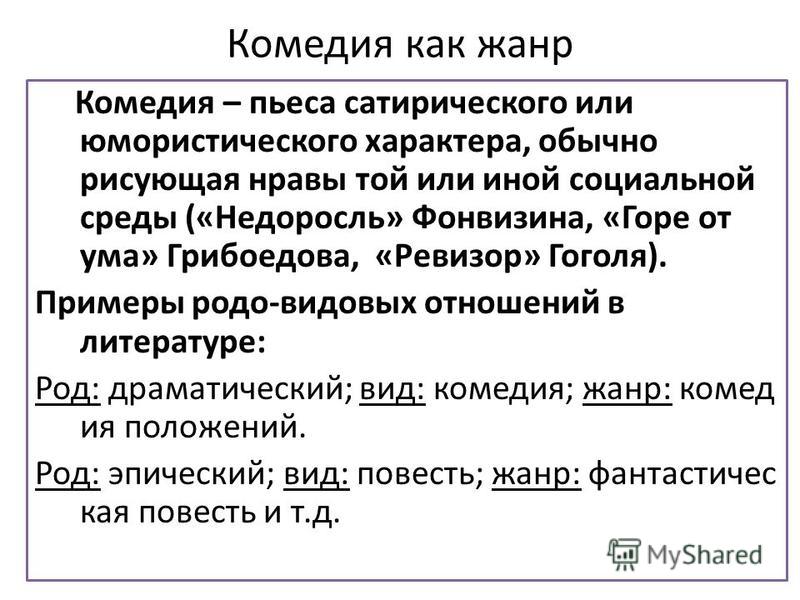
Types of comedy Lyrical comedy is associated with the work of A. Chekhov. It reveals the intimate feelings of the characters, synthesizes sad and cheerful. Positive hero through positive features gets into funny situations. In a family comedy, everyday life, customs, family relationships characters. This genre was formed in the era of classicism. In creative practice, it was used by Fonvizin ("Undergrowth"). Comedy of situations - a kind of comedy, which is based on intrigue, unforeseen situations, an unexpected twist in the plot of M Gogol ("The Government Inspector").
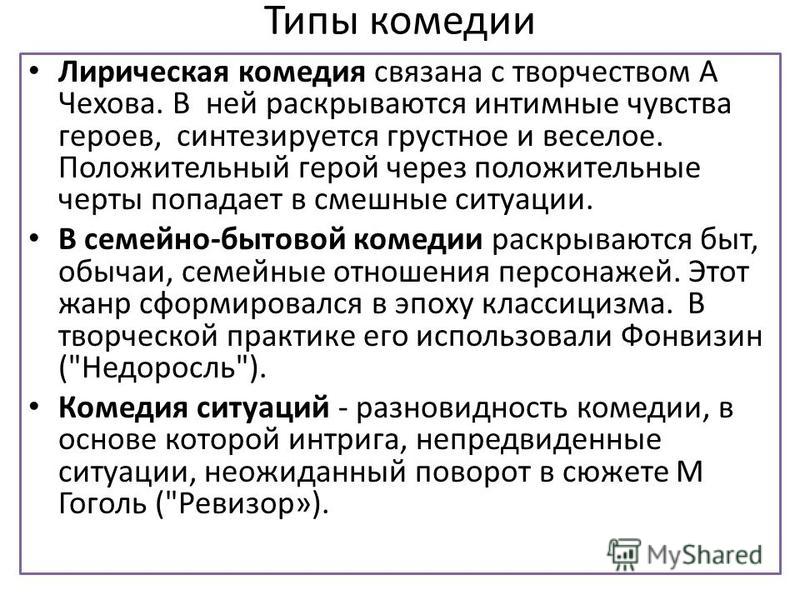
Traditions of classicism in comedy. The innovation of Fonvizin as a playwright In comedy, one can see the features of the realistic trend in literature (early realism): Combination of paintings household life and revealing the views of the characters. The characters of not only the main, but also secondary characters are carefully spelled out. The author does not hide his disposition and antipathy towards the heroes (he mercilessly executes some with angry indignation and caustic killing laughter, treats others with cheerful mockery, draws the third with great sympathy). skillfully revealed mental life heroes, their attitude to life, to people and actions. The author's remarks are especially significant. Each hero (especially the negative one) is a typical representative of his class. Each hero is a living person, and not a scheme, not the personification of any one quality, as it was before. The rules of classicism are violated by the author in the very construction of the comedy: in addition to funny (comic) scenes, there are also tragic scenes in comedy that reveal the difficult aspects of serf life. In addition to the main action, the plot is supplemented by scenes that are only indirectly related. Brightness and expressiveness of language. The heroes of the comedy turned out to be much more difficult than the tradition required. They are not only walking masks of the bearers of virtue or vice. Traditions of classicism in comedy. Subordination of the composition of a stage work rule of three unity: place, time, action. Events take place within one day and in one place (in a provincial manor estate, in the house of the landowner Prostakova). Satire should correct morals, teach. Vice and virtue must be presented visually, and virtue must, of course, triumph. The main characters of the comedy are sharply divided into two camps. According to the traditions of classicism, each hero must have some one characteristic feature. Prostakova is malicious, Prostakov is downtrodden, Skotinin is bestial, Mitrofan is ignorant, Starodum is direct, Pravdin is honest, Sophia is noble... In the plays of that time there is always a hero who directly expresses the ideas of the author, his most cherished and dear thoughts. In Undergrowth, this is Starodum. His the main task to express what the author wants to inspire the audience.
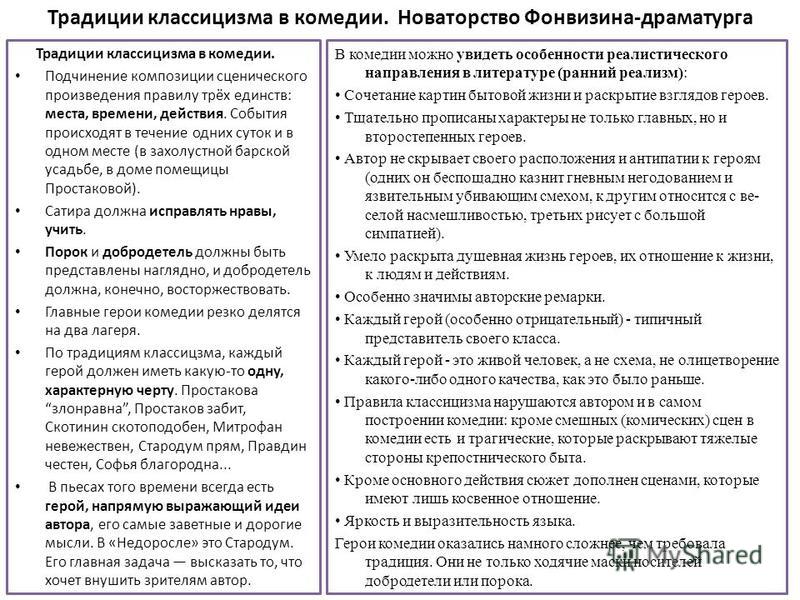
genre features. "Woe from Wit" Griboyedov. Griboedov's play combines the features of classic and realistic comedy: Features of the comedy of classicism. Rules of three unities: Unity of time (the action takes place within one day). Unity of place (the action takes place in Famusov's house). Unity of action (the basis for the development of the plot is the arrival of Chatsky in Moscow). Signs of the comedy of realism Heroes are presented versatile, devoid of the one-sidedness inherent in the comedies of classicism. For additional feature bad guys the author uses "talking" surnames: Khryumins, Molchalin, Tugoukhovskys, etc. The author is fluent in rhyme and colloquial form the words.

Auxiliary methods of characterization of characters Psychologism Auxiliary methods of characterization of characters are portrait, self-characterization, evaluation by other characters. Peculiar in drama and psychologism. There is no author's psychological narrative here. The internal monologue is brought out, is made out in external speech. Basic psychological technique- the direct form of speech.
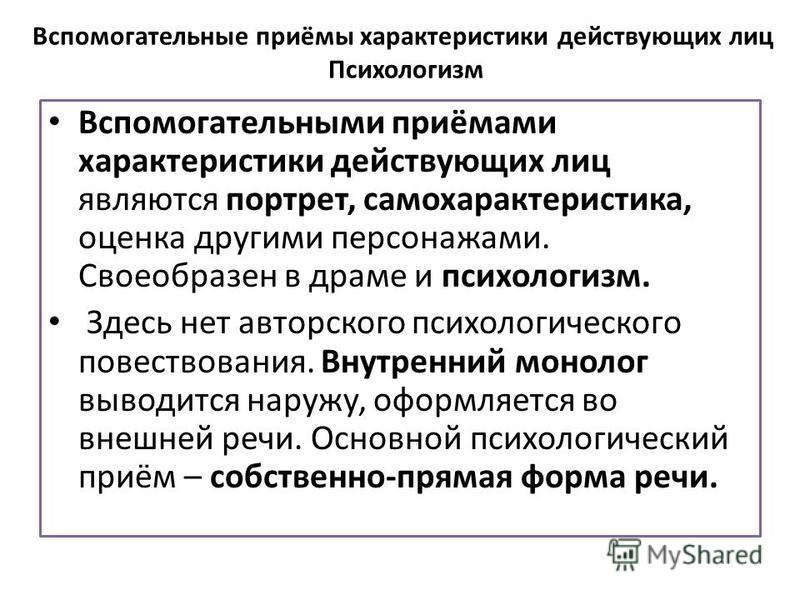
Conflict At the heart of any dramatic work is conflict. He drives the plot in a dramatic work. Conflict is an artistically expressed contradiction, opposition, it can be external and internal. External - between individual characters, internal - a contradiction between feelings, thoughts, impulses in the soul of the hero
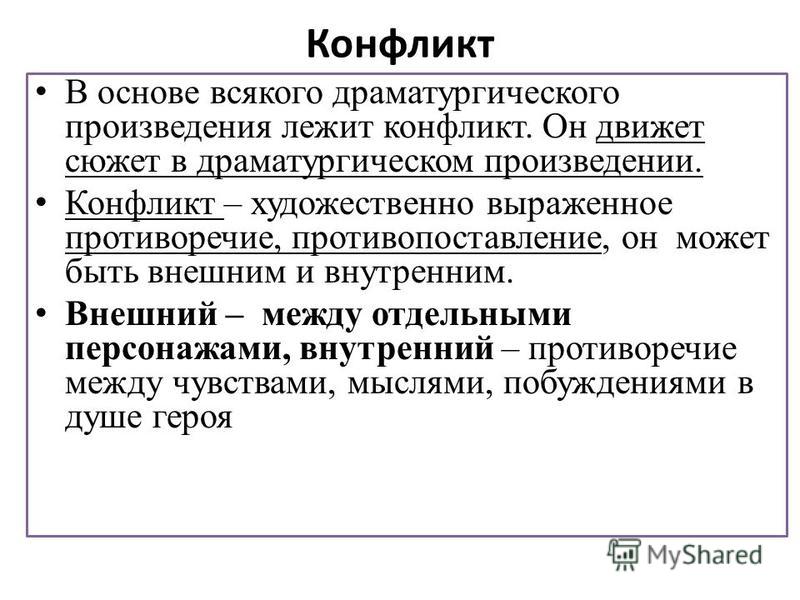
The nature of the dramatic conflict "Undergrowth" Fonvizin D.I. "Woe from Wit" A. Griboyedov "Thunderstorm" A. Ostrovsky The conflict of the Undergrowth is the struggle of progressive-minded advanced nobles - Pravdin and Starodum - with the feudal lords - Prostakovs and Skotinin. The conflict lies in the clash of two opposing views on the role of the nobility in public life countries. All the heroes of the comedy are drawn into the conflict, the action, as it were, is taken out of the landowner's house, family and acquires a socio-political character: the arbitrariness of the landowners, supported by the authorities, and the lack of rights of the peasants. The love conflict underlies the story and consists of the relationship of the following characters: Chatsky - Sofya Sofya - Molchalin Molchalin - Lisa Lisa - the barman Petrushka social conflict consists of confrontation between the following groups of heroes: Famusov society (Famusov, Skalozub, Gorichi, Countess Khryumina, Tugoukhovsky, Zagoretsky, Repetilov, etc.) - Chatsky and off-stage characters. Philosophical conflict (timeless) At the core is the problem of choosing a way of life, determined by worldview and principles. In "Thunderstorm" we meet both types of conflict: external - between individual characters, internal. On the one hand, this contradiction between rulers (Dikaya, Kabanikha) and subordinates (Katerina, Tikhon, Boris, etc.) is external conflict. On the other hand, the action moves due to the psychological conflict, internal - in the soul of Katerina.
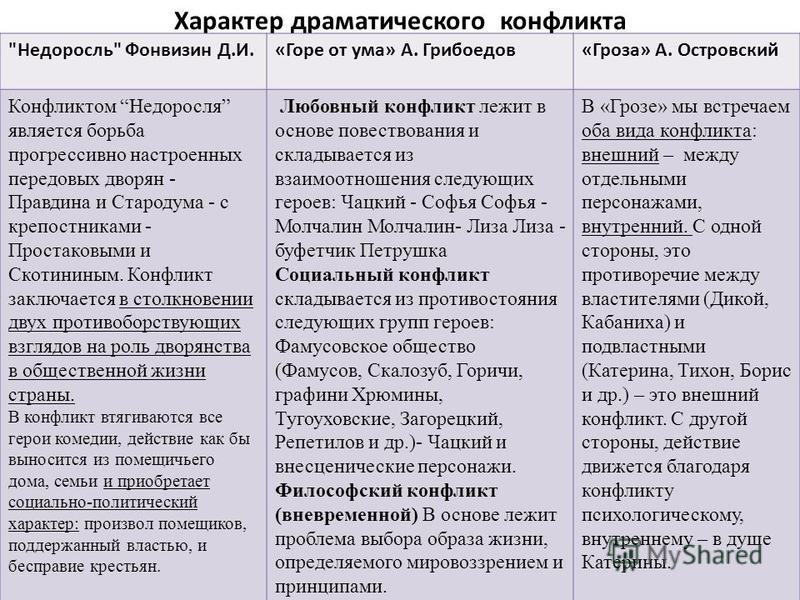
Plot elements The exposition is, as a rule, the initial part of the work, which precedes the plot, introduces the characters, the place and time of the action. For example, in “Woe from Wit” by Griboedov, this is 1-6 phenomena of 1 action (before the appearance of Chatsky). The beginning of the action (the event that starts the action in the work, causing all other events to follow). Arrival of Chatsky. Action development. Finally, the conflict reaches the point where the contradictions require immediate resolution, the conflict reaches maximum development is the climax of the denouement of the action. The final. Here the main problems are resolved, the conflict is resolved.
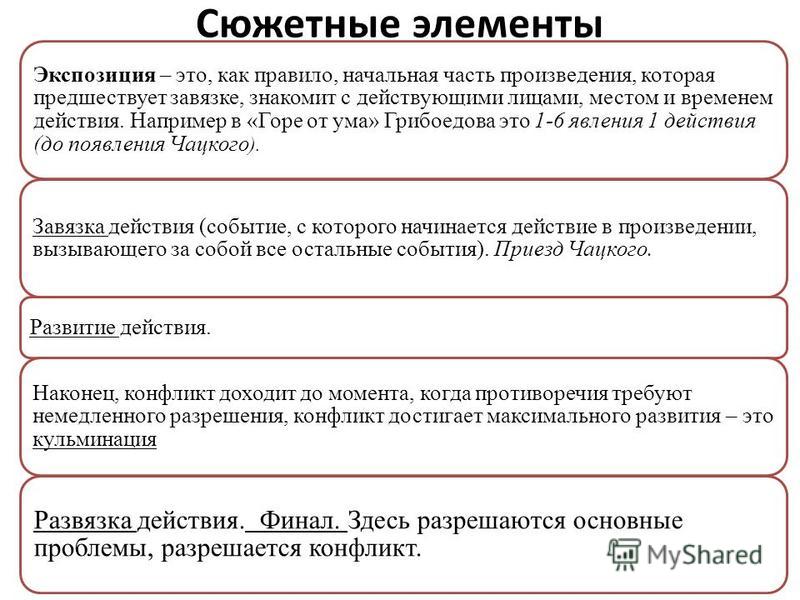
The plot and composition "Undergrowth" Fonvizin D. In the family of provincial landowners Prostakov lives their distant relative, left an orphan Sophia. Mrs. Prostakov's brother Taras Skotinin and Prostakov's son Mitrofan would like to marry Sophia. At a critical moment for the girl, when her uncle and nephew are desperately sharing her, another uncle Starodum appears. He is convinced of the evil nature of the Prostakov family with the help of the progressive official Pravdin. Sophia marries the man she loves, officer Milon. The Prostakovs' estate is taken into state custody for cruel treatment with the fortresses. Mitrofan is given to military service. Fonvizin based the plot of the comedy on the conflict of the era, the socio-political life of the 70s and the early 80s of the 18th century. This is a struggle with the serf-owner Prostakova, depriving her of the right to own her estate. At the same time, other storylines: the struggle for Sofia Prostakova, Skotinin and Milon, the history of the connection loving friend friend of Sophia and Milon. "Undergrowth" is a comedy in five acts. Events unfold in the estate of the Prostakovs. A significant part of the dramatic action in The Undergrowth is devoted to solving the problem of education. These are the scenes of Mitrofan's teachings, the vast majority of Starodum's moralizing. The culminating point in the development of this theme, no doubt, is the scene of Mitrofan's exam in the 4th act of the comedy. This satirical picture, deadly in terms of the strength of the accusatory sarcasm contained in it, serves as a verdict on the education system of the Prostakovs and Skotinins.
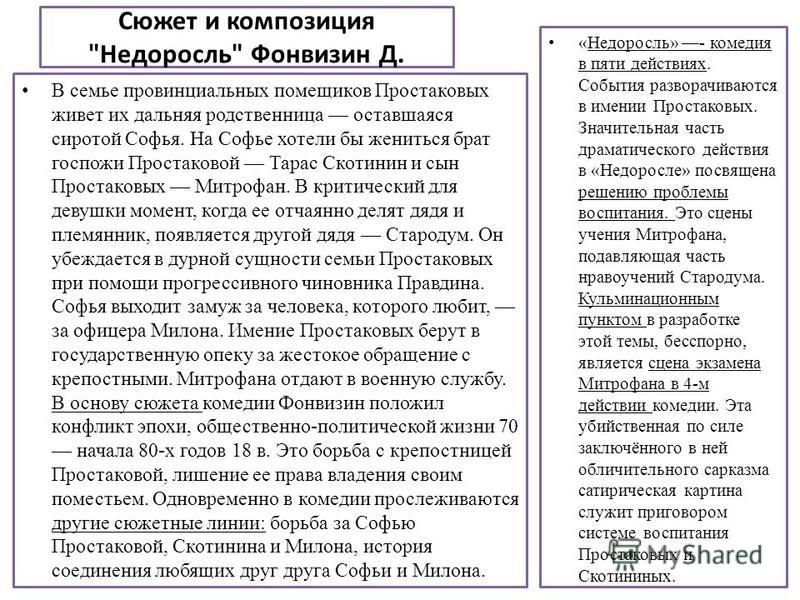
N.V. Gogol "Inspector General" Genre The goal set by the author is "to produce good influence on society" largely determined the specifics of the genre of the work. The Inspector General is a public comedy, it is not directed against individual, private vices of public life (which is typical for most comedies that were staged at that time), but against all the shortcomings of society. The plot and plot conflict in the play are not family and love circumstances, not private life people, but an event of public importance. The originality of the composition. Action in comedy begins with a plot. Gogol, without being distracted by particulars, introduces the reader to the essence of the dramatic conflict, which lies in failed attempt county officials to hide their official crimes from the capital auditor.
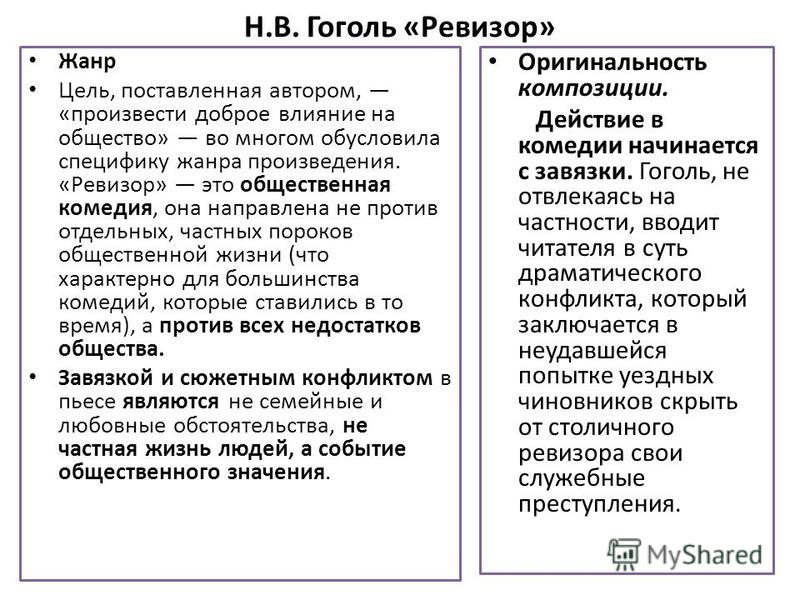
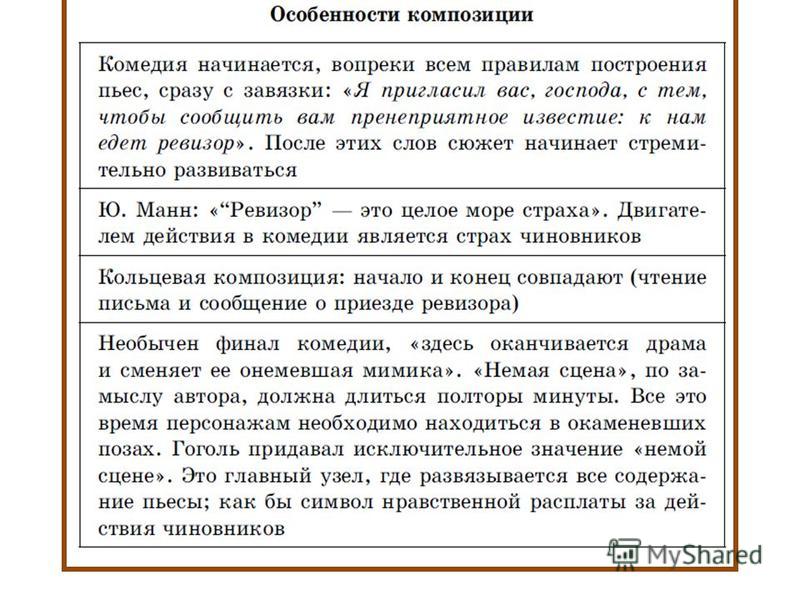
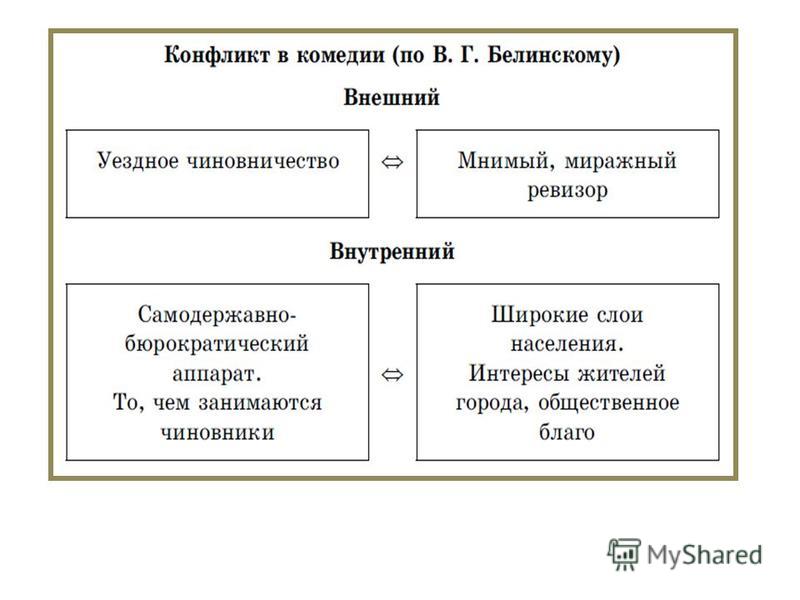
Plot Gorodnichiy county town Anton Antonovich Skvoznik-Dmukhanovsky informs the officials that an "auditor from St. Petersburg, incognito" is coming to their city, and recommends that appropriate preparations be made. Landowners Bobchinsky and Dobchinsky talk about visiting a hotel tavern and young man who, in their opinion, is the auditor. The officials anxiously disperse, the mayor goes to the hotel, gets acquainted with Khlestakov, offers the visitor money and asks him to move to his house, and also to inspect some institutions in the city for the sake of curiosity, "somehow charitable and others." He, not realizing that he is mistaken for an auditor, agrees. Khlestakov meets the mayor's wife and daughter and, talking with them, pretends that he is a very important person. Officials decide to give the visitor a bribe. He calmly takes the offered money. Then he writes a letter to his friend Tryapichkin in St. Petersburg, in which he tells how he was mistaken for " statesman". Osip, Khlestakov's servant, persuades him to leave as soon as possible. Before leaving, Khlestakov asks for the hand of the mayor's daughter. Not really understanding what is happening, Anton Antonovich blesses the young. Osip reports that the horses are ready, and Khlestakov announces that he is going to a rich uncle for one day, borrows money again and leaves. After seeing off Khlestakov, the officials find out that the person they took for the auditor "was not the auditor." A gendarme appears and announces: “An official who has arrived from St. Petersburg by personal order demands you to come to him at once.” Silent scene.

Conflict The main conflict on which the comedy is built lies in the deep contradiction between what city officials are doing and ideas about the public good, the interests of city residents. Lawlessness, embezzlement, bribery - all this is depicted in The Inspector General not as individual vices of individual officials, but as generally recognized norms of life, outside of which those in power cannot imagine their existence. For example, officials are almost sure that an auditor who has come from St. Petersburg will agree to take part in a dinner at the mayor's, will not refuse to take obvious bribes, because they know this from the experience of their city. The essence of the comedy of the conflict lies in the fact that the mayor and officials are fighting with a ghost that they created in their imagination. The stupid Khlestakov managed to deceive and deftly deceive the highly experienced and intelligent mayor and many more officials. The thing is that fear does not allow the mayor and officials to open their eyes when Khlestakov unleashes such a stream of lies on them that it is difficult to believe even for an unenlightened person.
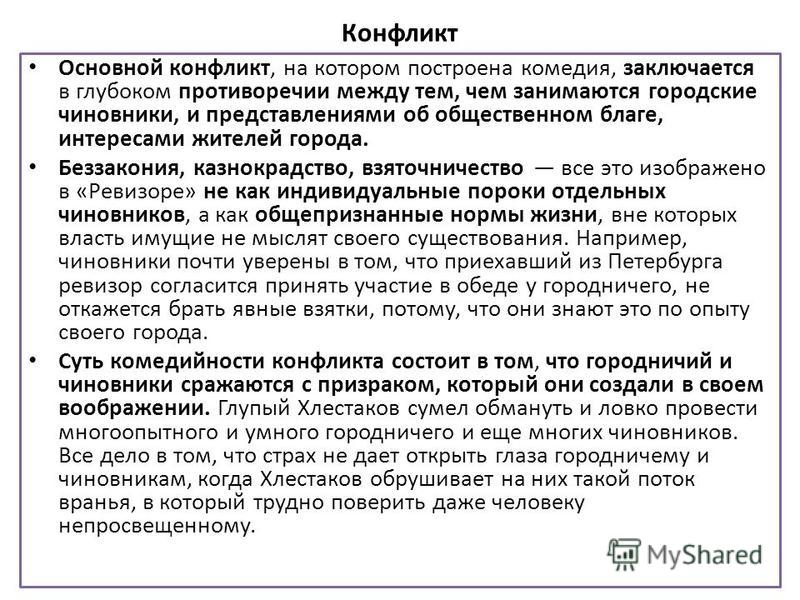
City The place of action in the "Inspector" is a provincial city. This is not just a small remote town. This is the image of the whole Russian Empire or even humanity as a whole, "the prefabricated city of the whole dark side". It is no coincidence that all the main strata of the population are depicted here: citizenship, merchants, officials and city landlords, and, finally, the mayor. In fact, Gogol created a model that is applicable to any Russian city. Thus, the scale of the work expands to the all-Russian, nation-wide (these events could have happened in any Russian city).
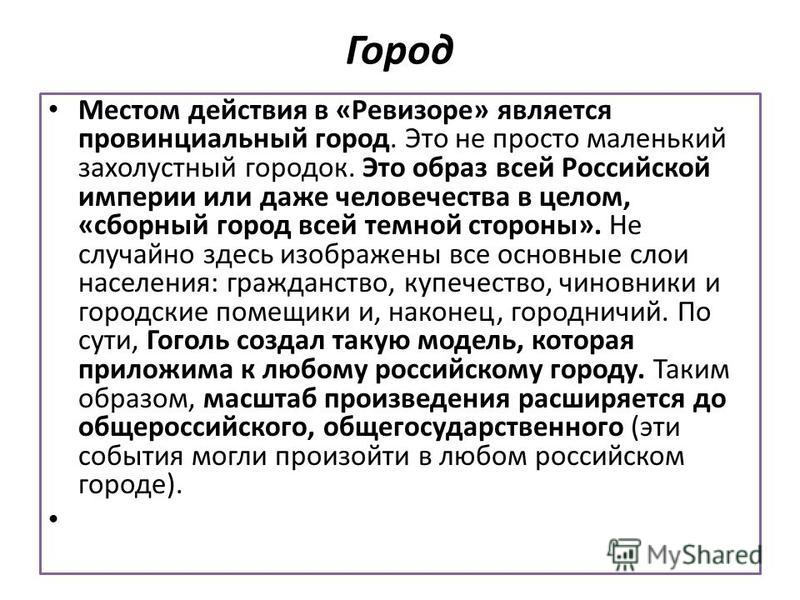
Plot elements in Ostrovsky's play "Thunderstorm" The denouement, which demonstrates the insolubility of the conflict (the death of Katerina). Since there are two conflicts in the play, each has its own culmination. climax internal conflict- Katerina's last monologue in act 5. The conflict reaches its maximum development - this is the culmination (4 days, 6 phenomenon). The development of action, that is, a series of episodes in which the characters are trying to actively resolve the conflict. The plot of Katerina's conflict with " dark kingdom"(1 action, 5-9 phenomena) and internal conflict (dialogue between Katerina and Barbara). The exposition is, as a rule, the initial part of the work, which precedes the plot, introduces the characters, the place and time of the action. There is still no conflict here (1 action, 1 -4 phenomena). Here the author creates an image of the world in which the characters live and events unfold.
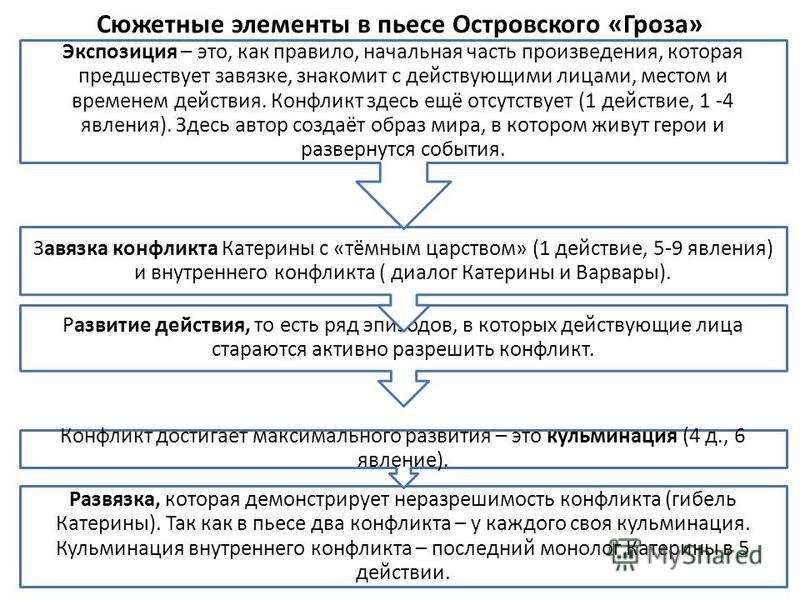
Decoupling of action. Finale Here the main problems are resolved, the conflict is resolved. For example, in A. Ostrovsky's play "Thunderstorm" - external and internal, acquire completeness artistic images(all the characters, except Tikhon, are true to themselves), including through symbolic ones (flight - falling from a height - leaving for the free world; captivity - will; "thunderstorm" broke out, cleansing should come after it). The finale also serves as a compositional completion of the work: an annular landscape design, an exit from the closed space of tyranny and fear to the banks of the Volga. In the finale, the tragic pathos of the play is especially clearly manifested: the inevitability of the death of the heroine is associated with the optimistic sound of the work, since the hero remained undefeated.

Chronotope in Groza The scene in Groza is the fictional town of Kalinov on the high bank of the Volga. (Then this town will become the scene of his other dramas "Forest", "Hot Heart".) The time of action is "our days", that is, the very end of x. The action takes place on the banks of the Volga, symbolizing will, freedom. Here, according to Kuligin, "beauty". This "beauty" is opposed by the image of the city of Kalinov. The city of Kalinov, under the pen of Ostrovsky, turns into an independent image, becomes one of the equal heroes of the play. He lives his own life, has his own character, his own temper. As the city sage Kuligin says, " cruel morals sir, in our city, they are cruel!" Invisible, inaudible tears flow in him, and on the surface there is silence and grace. If it were not for Katerina with her public rebellion against tradition, everything would have been so quiet and sweet, the storm would have passed by.
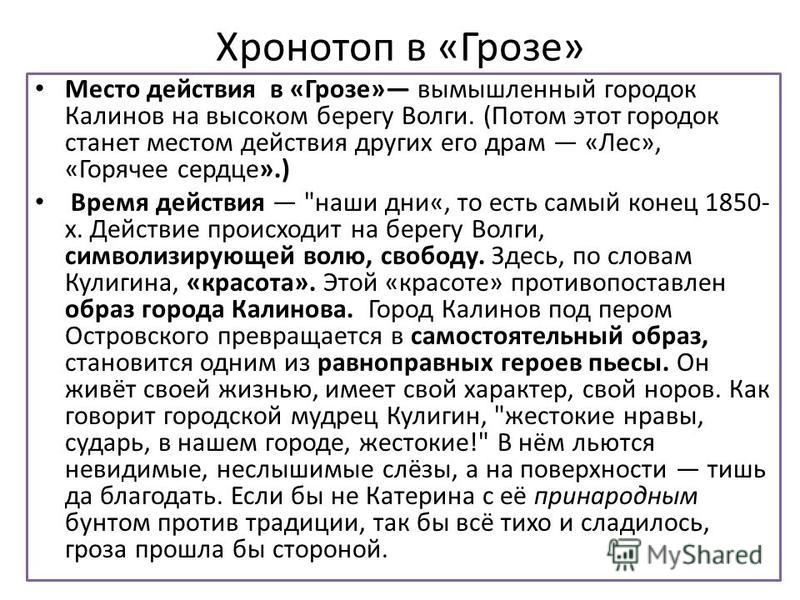
The play has an open stage space. Stage events are brought outside the merchant's house. Of the five acts, only one is concentrated in a "closed" room, all the rest are taken outside, into an open urban space. Everything in this space is symbolic. It seems to be divided into three levels. On the top point this space is the high bank of the Volga. in the middle straight line city houses. Below is a ravine, into which the path from the Kabanikhi's house leads, and the Volga whirlpool. Most Kalinovskie residents are satisfied with the "average" level. They live, accepting the urban reality as it is. For some of them, the "walk" into the ravine, where Katerina meets Boris, is like a fall into sin, a descent into the underworld. For others, like for Varvara and Kudryash, the ravine is "just" a place of rendezvous, devoid of symbolic meaning. And for Katerina, going down into the ravine is like rising above the city, standing above its indifference. Alas, for such an ascent through the descent, she must pay a terrible price: in the end, she must climb to the high bank of the Volga and throw herself off a cliff into a whirlpool. The lower she descends, the higher she rises, and the higher she rises, the more terrible she falls - such is the paradoxical symbolism of the play.
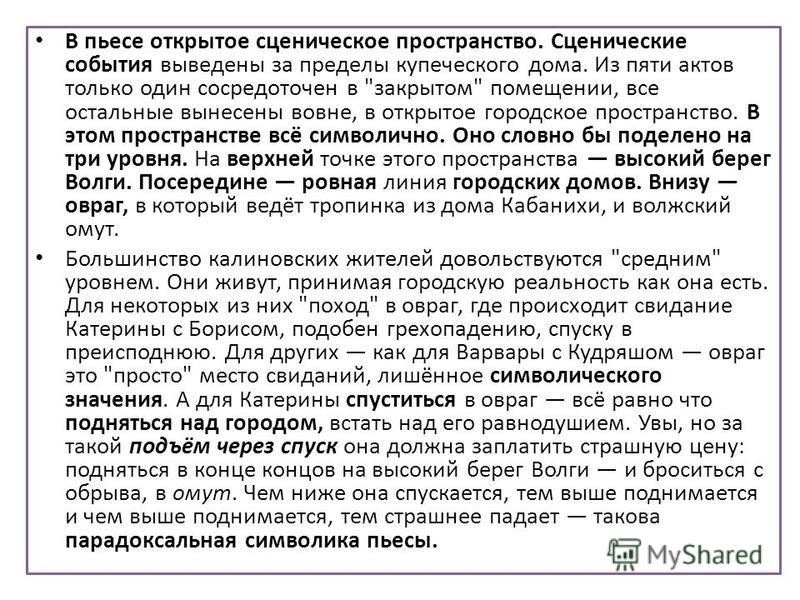
Formulations of test tasks Remarque AphorismOut-of-stage images What is the name a brief description of the author of what is happening on the stage, which is a recommendation to the actors regarding their behavior, gestures, facial expressions, speech tempo, etc. (for example, sit down)? What term denotes the author's remarks and explanations in the course of the play (Ms. Prostakova (quietly to Mitrofan)? Many statements of the heroes of the play "Woe from Wit" have become part of everyday colloquial speech. What is the name of judgment general, expressing in concise art form a complete and generalized thought, philosophical or worldly wisdom, an instructive conclusion (“And if it weren’t for me, would you smoke in Tver”)? The mayor pronounces the phrase: “What are you laughing at? Laugh at yourself." What is the name of the saying, characterized by brevity, capacity of thought and expressiveness? What are sayings that express complete and generalized thoughts in a concise form: “ Great Sovereign there is a wise sovereign”, “everyone should seek his happiness and benefits in the one thing that is lawful ...”, “science in a depraved person is a fierce weapon to do evil”, etc.? Korobkin's wife does not take part in the main action, she appears only in the above scene. What is the name of such a character? In the stories of Mrs. Prostakova and Skotinin, the “dead father” and Uncle Vavila Faleleich appear. What are the names of the characters mentioned in the speech of the heroes, but not appearing on the stage?
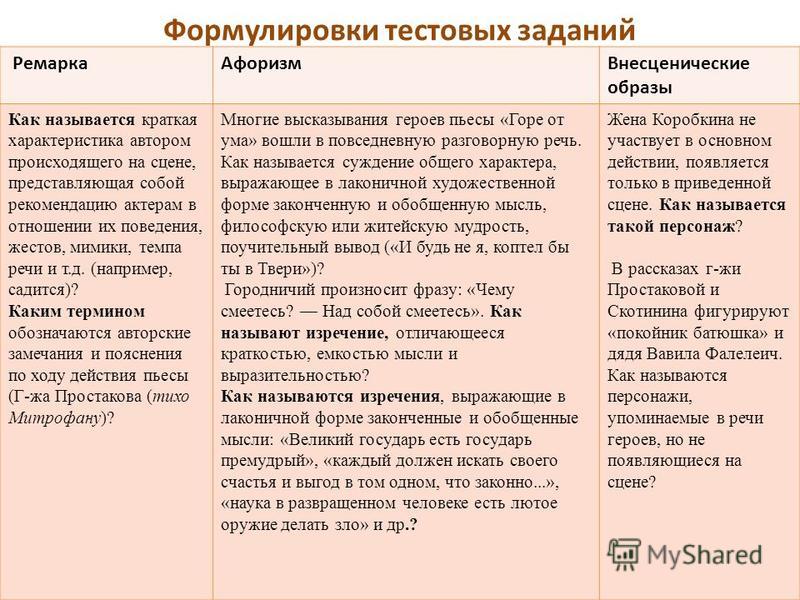
Irony "Speaking" names and surnames exposition Dialogue Name the artistic device, which consists in the fact that the implied meaning of a word or phrase is the opposite of the literally expressed ("Mistress of interpreting decrees"). In the surname of Khlestakov, as in the surnames of other characters in the play, a certain figurative characteristic. What are these surnames called? The above scene contains information about the characters, the place and time of the action, and describes the circumstances that took place before it began. Indicate the stage in the development of the plot, which is characterized by these features. What is the name of the form of communication between the characters (for example, a conversation between Sofia and Famusov), which serves as a way to characterize the characters and motivates the development of the plot? The names and surnames of the characters in this episode carry a certain semantic load. What are these names and surnames called? What term refers to the form of speech of characters, which is an exchange of remarks?
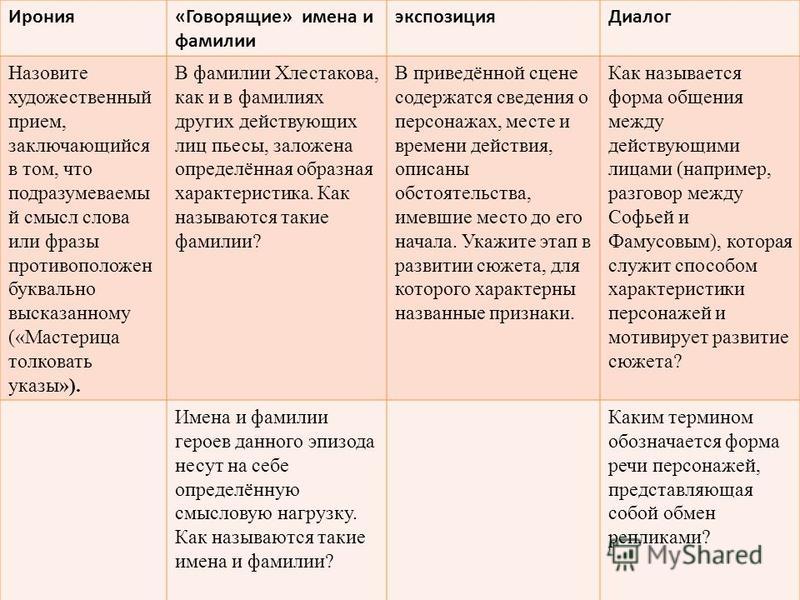
Conflict MonologueSatire From the first scenes of the play, it outlines the confrontation between the "older" and "younger" generations. What is the name of an acute contradiction, a collision that underlies a dramatic action? A significant part of this fragment is Khlestakov's story about the splendor of his life in the capital. What is the name of the extended statement of one person in the play? Katerina's response to Boris's remark (Who knew that it was for our love to suffer so much with you! It would be better if I ran away then!) is a complete detailed statement. What is this type of utterance in a play called? What is the name of a kind of comic annihilating ridicule of the subject of the image, the disclosure of its internal inconsistency, characteristic of this play? Gorodnichiy's answer to his wife's remark is a complete detailed statement. What is this type of utterance in a play called?
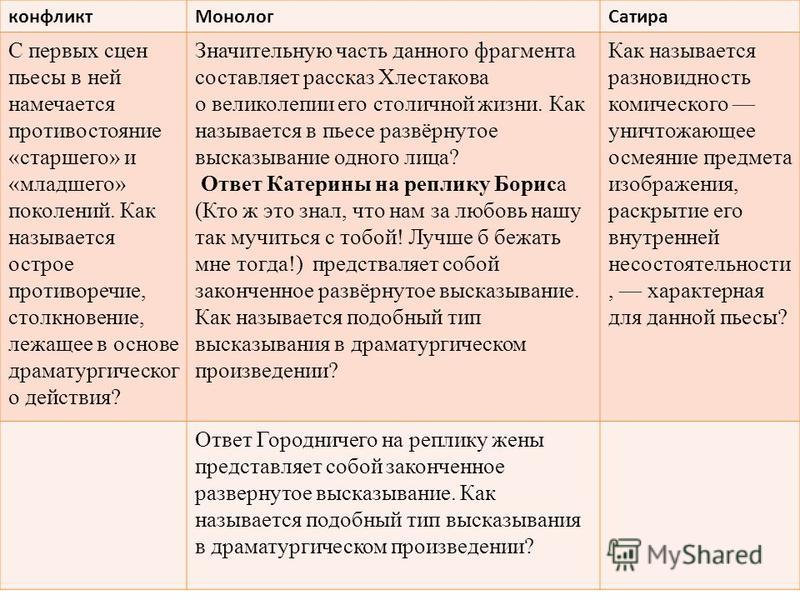
Climax Colloquial What is the name of the moment of the highest tension in the development of a dramatic plot, to which the above fragment refers? The speech of the characters is replete with words and expressions that violate literary norm(“such rubbish”, “grip me”, etc.). Specify this type of speech. Write the terminological name of verbal and grammatical forms, giving the heroes’ speech a rough, stylistically reduced tone: “you always want to toil around idle”, “and then get married”, “swindled”. In his remarks, Dikoy uses the words: “fool”, “snout”, “elestricity”, etc., indicating his ignorance and rudeness. What is the name of everyday speech that allows distortion literary language, elements of which are present in Dikoy's speech?
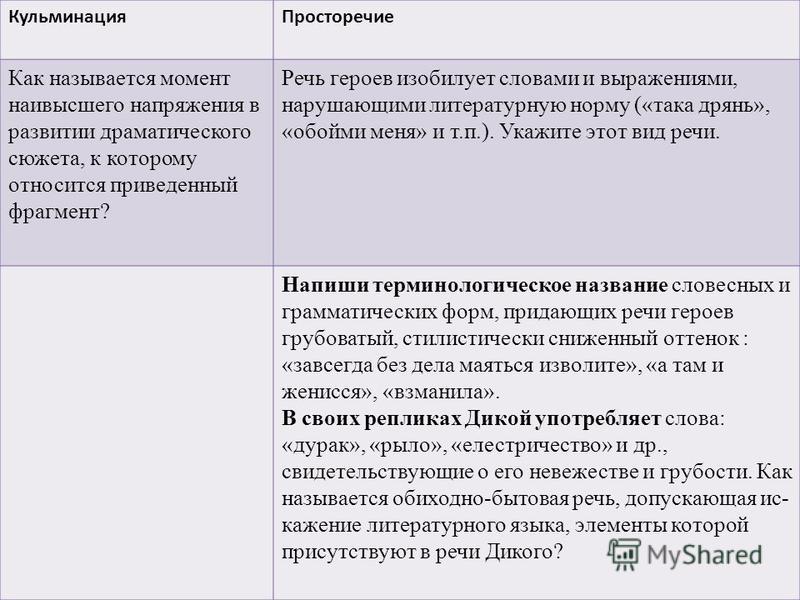
Repeat HyperboleDetail "Yes, he disgusted me, disgusted me .." "It's so hard, so hard." How is this trick going? Wanting to show his importance, Khlestakov uses a clear exaggeration: "thirty-five thousand one couriers." What is the name of artistic technique based on exaggeration? Artistic detail- expressive detail feature some object, part of everyday life, landscape or interior, carrying an increased emotional and meaningful load; characterizes not only the subject, of which it is a part, but the entire objective world, determines the attitude of the reader. What term denotes a significant small detail that contains an important meaning (for example, the father's chest from the story of Ms. Prostakova)?
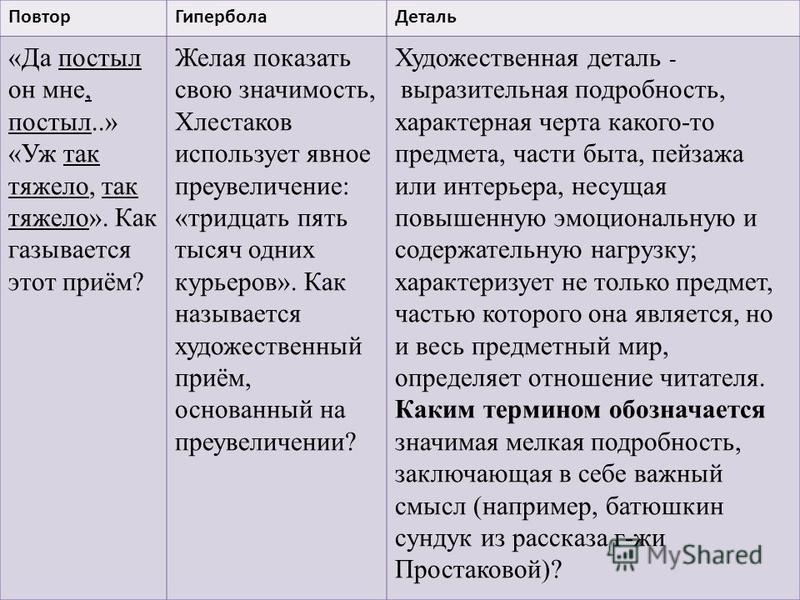
Artistic detail The nature of everyday details is the combination of details into a certain system; a single detail as part of a system familiar to the reader; opposition of details to each other; repetition of the same detail or a number of similar details; exaggeration of the detail; grotesque details; endowing objects independent life; color, texture, sound noted in the description of the part; view of the detail image; the attitude of the author and the hero to the described household items Functions of details characterization of the character; disclosure technique inner world character; means of communication, typification; means social characteristics character; ethnographic detail; details as signs of a cultural and historical nature; details designed to evoke certain associations and analogies in the reader; a detail designed for the emotional perception of the reader; symbol detail; detail-characteristic of living conditions
